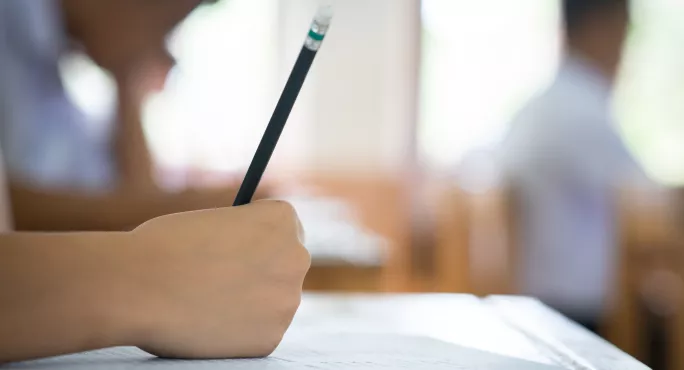Why teachers’ worst fears over exams have come true

Immediately following education secretary John Swinney’s announcement in December that all Scottish Qualifications Authority (SQA) exams would be cancelled in session 2020-21, I got into what is sometimes called a “spat” with another secondary teacher on Twitter.
I fully supported the decision to cancel exams, and I couldn’t believe that anyone in the profession wouldn’t. But my colleague - a science teacher - was worried. She was adamant that all the SQA had done was hand the administration of exams to schools. Not a chance, I said. Like last year, we’ll use what evidence we can gather to come up with a grade that reflects each student’s ability. Assessments will be used as a guide, but the final decision will be based on professional judgement. “Inferred attainment”, like in 2020 - right?
Well, no. What has happened since has confirmed my colleague’s worst fears: teachers are now question-setters, markers, team leaders, principal assessors and invigilators. All for £400, minus tax.
Flashback to December: Scotland’s 2021 exams cancelled by education secretary
Opinion: ‘Saying there’s no need for exams lets down schools’
SQA: ‘No requirement to replicate full formal exams’
The 2020 qualifications fiasco: 12 key messages from experts who explored the SQA debacle
Covid: SQA and Education Scotland defend their performance
But this isn’t primarily a story about workload. Most of us would be willing to put in the hours if it meant that the outcome for students would be fair. That, after all, was the whole point of scrapping exams. Mr Swinney announced in December that a model based on teacher judgment would be “safe” and “fair”, that “it better recognises the reality of the disruption so many pupils have already had to their learning”.
Four months on, I’m not convinced that this reality is being recognised. We know that Covid hit the poorest areas hardest, so those in the lowest SIMD (Scottish Index of Multiple Deprivation) areas spent more time in Covid self-isolation between August and Christmas than their counterparts in higher SIMDs. According to the Scottish government’s own statistics, between 17 August and 8 December, around 46 per cent of pupils in the lowest-income groups had time off school for a Covid-related reason, compared to around 32 per cent; among the most well-off. In the same period, just 44 per cent of pupils in the most deprived areas achieved more than 90 per cent attendance at school; among the least deprived, that figure was 74 per cent (for the source of that data, see here).
Exams by another name
When schools closed at Christmas, those same pupils will have been hit the hardest once again. And yet they now must prove themselves under the same conditions as their richer classmates, in high-stakes “assessments” taking place in April and May. As every teacher - and, let’s face it, every student - knows, exams by any other name are still exams: when everything rests on your performance on the day, regardless of your experience of the past year, that’s an exam.
How did we get here? The answer, of course, lies in last year’s exam debacle. The SQA’s now-notorious algorithm spat out results that were in some cases difficult to fathom and in others downright bizarre. This year there would be no algorithm. But out with the bathwater has gone the baby: not only will we have no algorithm, but there will be no room for professional judgement either.
It’s “demonstrated attainment” all the way. Why? Because in their desperation to save their own skins, those at the top of Scottish education threw teachers under the proverbial bus last summer. You see, it was our unrealistic predictions that made the algorithm necessary.
As the SQA put it: “We have maintained the integrity and credibility of our qualifications system, ensuring that standards are maintained over time, in the interests of learners, through judicious moderation of grades.” Except that no moderation took place. Without looking at a single piece of candidate evidence, or even discussing “anomalies” with schools and further education colleges, the SQA altered one in every four results. We know about the ensuing chaos.
So, this year we are bound by what’s on paper. Whether you’re in a school that was barely affected by Covid, or had three two-week periods of self-isolation between August and Christmas, you have to go in and prove yourself on the day. Those who struggled to get peace and quiet and a working device during remote learning are pitted against those who had tutors and their own iMac. And yes, ‘twas ever thus, but this year would a bit of compassion go amiss?
My colleague on Twitter was right to be worried. If Covid has taught me anything, it’s to listen to the scientists.
Alasdair Allan is a principal teacher of English, based in Scotland
You need a Tes subscription to read this article
Subscribe now to read this article and get other subscriber-only content:
- Unlimited access to all Tes magazine content
- Exclusive subscriber-only stories
- Award-winning email newsletters
Already a subscriber? Log in
You need a subscription to read this article
Subscribe now to read this article and get other subscriber-only content, including:
- Unlimited access to all Tes magazine content
- Exclusive subscriber-only stories
- Award-winning email newsletters
topics in this article



